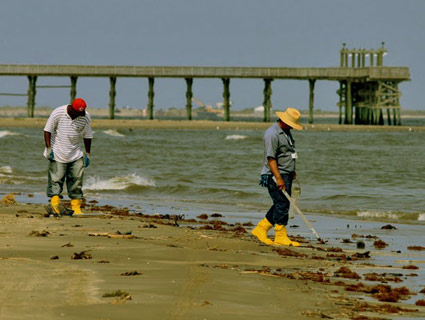Almost one year since creating the worst oil spill in US history, BP is holding steadfastly to its response strategy: Duck and hope for the best. At its annual shareholder meeting in London yesterday, five Gulf residents who flew in to tell investors about their loss of livelihood were denied entry. A few tried to sneak in, among them 62-year-old Diane Wilson, a fourth-generation fisherwoman from Seadrift, Texas, who covered herself in oil to make a statement. Police arrested her for “breaching the peace,” the Associated Press reports. Others who made it in were dragged out by security guards. NBC’s Nightly News has more on this:
Is there any other way for a major corporation to deal with these kinds of situations but ignore protestors and feign optimism? BP’s chief executive Bob Dudley doesn’t seem to think so, based on what he told shareholders on Thursday:
BP remains a great company with a great history and I believe a great future…Not every company gets such an opportunity and we don’t intend to squander it.
Except, er, you kind of already did squander it. For all its promises to compensate victims, many have not yet been paid out. Journalists have been barred consistently from accessing the coastal areas affected by the spill.
And why wouldn’t BP ignore its victims, when few in Washington seem to care that much? Mother Jones‘ Kate Sheppard told us earlier this week about certain GOP Congressmen who are trying to expand off-shore drilling. And as Mac McClelland reported, Kenneth Feinberg, whom the president appointed to oversee victim compensation issues in the Gulf, was entirely unmoved by victims complaints at a recent town hall meeting in Louisiana. All of which is why the Thomas Jefferson Center for the Protection of Free Expression named the company and the Obama administration the worst First Amendment violators of 2011.
Meanwhile, some BP shareholders are increasingly frustrated about the way things are going. Investors accounting for 60 percent of shares voted yesterday against re-electing William Castell as the head of its safety committee, while about 7 percent voted against re-electing Carl-Henric Svanberg as BP chairman. Around 11 percent voted against the company’s remuneration report, which awarded bonuses to Iain Conn, who oversees BP’s refining activities, and Chief Financial Officer Byron Grote. BP might continue to ignore its oil spill victims, but good luck dodging your investors.













